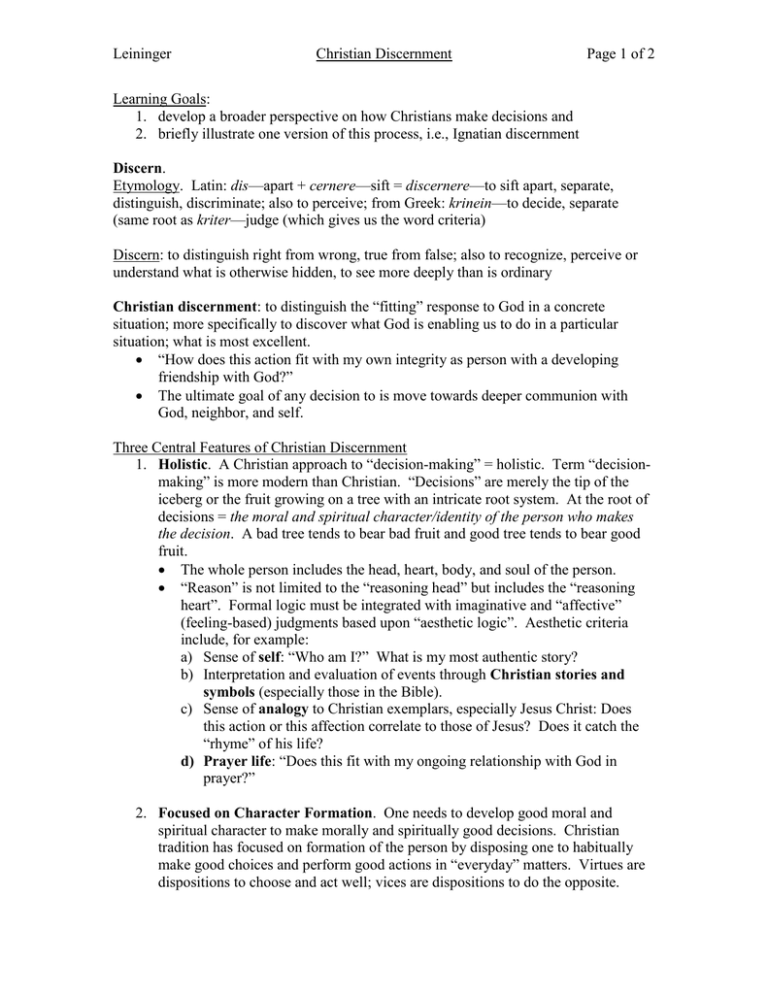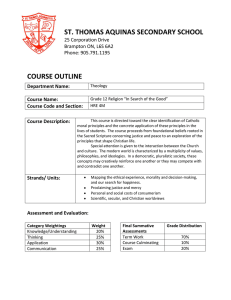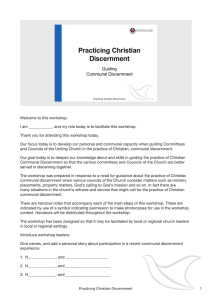Leininger Christian Discernment Page 1 of 2 Learning Goals:
advertisement

Leininger Christian Discernment Page 1 of 2 Learning Goals: 1. develop a broader perspective on how Christians make decisions and 2. briefly illustrate one version of this process, i.e., Ignatian discernment Discern. Etymology. Latin: dis—apart + cernere—sift = discernere—to sift apart, separate, distinguish, discriminate; also to perceive; from Greek: krinein—to decide, separate (same root as kriter—judge (which gives us the word criteria) Discern: to distinguish right from wrong, true from false; also to recognize, perceive or understand what is otherwise hidden, to see more deeply than is ordinary Christian discernment: to distinguish the “fitting” response to God in a concrete situation; more specifically to discover what God is enabling us to do in a particular situation; what is most excellent. “How does this action fit with my own integrity as person with a developing friendship with God?” The ultimate goal of any decision to is move towards deeper communion with God, neighbor, and self. Three Central Features of Christian Discernment 1. Holistic. A Christian approach to “decision-making” = holistic. Term “decisionmaking” is more modern than Christian. “Decisions” are merely the tip of the iceberg or the fruit growing on a tree with an intricate root system. At the root of decisions = the moral and spiritual character/identity of the person who makes the decision. A bad tree tends to bear bad fruit and good tree tends to bear good fruit. The whole person includes the head, heart, body, and soul of the person. “Reason” is not limited to the “reasoning head” but includes the “reasoning heart”. Formal logic must be integrated with imaginative and “affective” (feeling-based) judgments based upon “aesthetic logic”. Aesthetic criteria include, for example: a) Sense of self: “Who am I?” What is my most authentic story? b) Interpretation and evaluation of events through Christian stories and symbols (especially those in the Bible). c) Sense of analogy to Christian exemplars, especially Jesus Christ: Does this action or this affection correlate to those of Jesus? Does it catch the “rhyme” of his life? d) Prayer life: “Does this fit with my ongoing relationship with God in prayer?” 2. Focused on Character Formation. One needs to develop good moral and spiritual character to make morally and spiritually good decisions. Christian tradition has focused on formation of the person by disposing one to habitually make good choices and perform good actions in “everyday” matters. Virtues are dispositions to choose and act well; vices are dispositions to do the opposite. Leininger Christian Discernment Page 2 of 2 Christian virtues dispose one toward right relationship with God, neighbor, and self and away from sin. The more deeply a Christian has internalized the Christian story the better equipped she will be to recognize what actions are most appropriate to that story in concrete situation. 3. Tools for Character Formation. a) Prayer—listening and talking to God; coming to know oneself--one’s sinful tendencies and one’s gifts--in relationship to the source and goal of one’s being, i.e., God b) Scriptures—listening to, reciting, singing, praying with, and studying the authoritative revelation of God and our relationship to God c) Tradition—participating in a way of life embodied in stories, practices (including prayer), attitudes, worldview, etc. handed over from one generation to another. d) Reason—developing the skill of disciplined, logical reflection on the order of God’s creation e) Experience—learning from what you and others have lived through Ignatian discernment (“discernment of spirits”): “sifting apart” spirits from God vs. not from God (note: spirits refers broadly to inner promptings, desires, etc. that may or may not be prompted by the Holy Spirit). Discerning God’s will goes beyond discerning spirits and always includes evaluation of circumstances, options, values, goals, and whatever else we can know through reason informed by faith.



